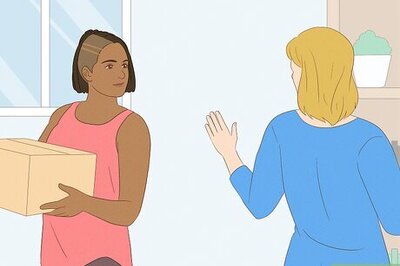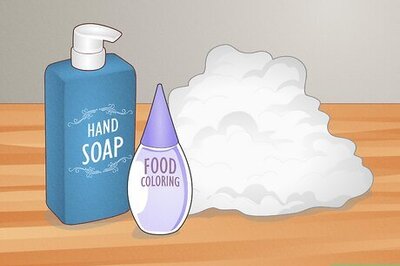
views
“Don’t Be a Karen” Meaning
“Don’t be a Karen” is a warning to stop behaving rudely. “Karen” is a slang term that typically refers to a middle or upper class white woman who has an entitled attitude. Karens are known for treating people poorly, especially service industry workers. For example, a Karen might ask to speak to the manager at a restaurant or store to unfairly complain about an employee and belittle them. If someone says “don’t be a Karen” to you, they may be pointing out that you're behaving in this way and warning you to stop.
Where does the term “Karen” come from?
“Karen” is a slang term that originated in online memes. In these memes, Karens are depicted as middle-aged white women with entitled, rude, and often racist attitudes. The stereotypical Karen also has a blonde asymmetrical bob haircut, appropriately termed the "speak to your manager" haircut. The exact origin of the term “Karen” is unclear, but some people think it may come from the 2004 movie Mean Girls. In the movie, a character says, “Oh my god Karen, you can’t just ask someone why they’re white.”
The term "Karen" experienced a wave of popularity in 2020. Karen memes have been around since the 2010s, but there was a resurgence of the term in 2020 when several videos of white women harassing people of color for no reason went viral on social media. One of the most infamous incidents involved a woman calling the police on an African American birdwatcher in Central Park, simply because he asked her to put her dog on a leash. This woman was dubbed “Central Park Karen.” In this context, Karen memes have been a way for people of color to call out unacceptable behavior and hold people accountable, while also using humor to cope with the trauma of dealing with these behaviors on a regular basis. The popularity of Karen videos has even led to the introduction of legislation like the CAREN Act (Caution Against Racially Exploitative Non-Emergencies Act), which would officially make it a hate crime to call the police on people of color in a non-emergency situation.
Examples of Karen Behavior
Asking to “speak to the manager.” If someone is acting like a Karen, they may ask to talk to the manager of a restaurant or retail store over something that isn’t actually a big deal. Then, when the manager comes, they’ll likely speak in an entitled or demanding way, while belittling an employee who actually did nothing wrong. Here are some more specific examples: Asking to speak to a restaurant manager to demand to order breakfast, even though it's already noon and your server informed you that breakfast isn’t served after 11:00 a.m. Asking to speak to a manager at a clothing store to complain about an employee who (rightfully) informed you that you can’t return an item without your receipt. Asking to speak to a manager at a coffee shop to complain that the barista made you the wrong drink, when you’re the one who didn’t specify that you wanted oat milk.
Being rude to service industry workers. Karens are also known for being rude or even belligerent toward employees when they’re just trying to do their jobs. Since Karens are usually depicted as affluent white women, the general understanding is that this behavior stems from a sense of privilege and entitlement. For example, a Karen might yell at a server at a restaurant because their food was made wrong, even though the server had no control over the kitchen’s mistake. A Karen might also be rude to a pharmacy tech because a medication isn’t ready, even though it's not the tech's fault that the doctor hasn't called in the prescription yet.
Expecting special treatment or freedom from rules. Karens expect everything to go their way. For example, a Karen who booked plane seats for her family in various rows might ask a single person to switch, so that the family can sit together. If the individual refuses (as is their right), the Karen might call the flight attendant to complain and cause a scene. Another example would be a Karen showing up to a fully-booked restaurant without a reservation and demanding to be seated because she’s a “loyal customer” who “spends a lot of money” there. Refusing to wear a mask in a location that requires them or refusing to adhere to the vaccination requirements at a child’s school are also quintessentially Karen behaviors.
Not caring about your children being disruptive in public. A common Karen behavior would be letting one’s kids run wild, without any regard for the disruption they’re causing. For example, a Karen might let her children play around the dining room of a fancy restaurant, when it’s clear that etiquette requires staying seated at the table to avoid disturbing other diners or getting in the way of servers. Another example would be bringing children to a wedding, even though the invitation specified that it was supposed to be child-free.
Racist comments or actions. Memes and videos on the internet often depict Karens as entitled white women engaging in racist behaviors. These behaviors can range from microaggressions (like assuming that someone isn’t American based on their race and asking where they’re “really from”) to outright racist actions (like calling the police on a person of color for no reason). The viral Central Park Karen who called the police on an African American birdwatcher would be an example of the latter.
How to Deal with Karens
Try to stay calm, and focus on offering a solution to the problem. For example, if the Karen is trying to get a refund for a piece of clothing at the store where you work but they don’t have a receipt, let them know about any alternatives your store offers, like store credit or an exchange for another item. Even though the Karen is in the wrong, it’s usually best to defuse the situation as quickly as possible, so you don’t have to deal with them longer than necessary.
Keep a record of what is occurring and know your rights. If someone is acting like a Karen toward you, it can be helpful to document what’s going on, so that you have a record of what actually happened. This is especially important if the Karen is engaging in an illegal behavior (like making a false report to the police). Video documentation can help establish what really happened and make sure the Karen is held accountable. For example, when the “Central Park Karen” unfairly called the police on an African American man, he took a video of the encounter to document it. The video helped prove the truth of what occurred, and the woman was later fired from her job and charged with filing a false police report.
Call out friends or family members if they engage in Karen behaviors. It can be uncomfortable to point out that a loved one is acting like a Karen, but it can also be very beneficial. You may be able to steer them in the right direction and help them avoid acting this way in the future. For example, if you’re out to dinner with a relative and they are acting in a rude or entitled way toward your server, consider pointing this out. They may not have known they were acting like a Karen, and when they realize this, they may feel compelled to stop and apologize. They may also be more mindful of this behavior going forward.
How to Respond if Someone Calls You a “Karen”
Assess your behavior to see if you’re acting like a Karen. Say, for example, that you politely sent your food back at a restaurant because it came with cheese on it, and you had asked your server to hold the cheese. This would not be Karen behavior. On the other hand, if you blew this minor mistake out of proportion and spoke to your server in a rude or demeaning way, you may have been acting like a Karen.
Own up to your mistake and apologize. If you’ve concluded that you were actually behaving like a Karen, take responsibility for your actions and apologize to the people involved. Acknowledge that you behaved poorly, and tell the other person that you’re sorry.
Ask for clarification if you need it. If you’ve assessed your behavior but you still don’t understand why the other person called you a Karen, calmly ask them what they meant. Talking things out may help you understand where they were coming from. For example, the other person may explain that they were simply joking, in which case the two of you can move on. Alternatively, they may have been trying to warn you that something you said or did came off as rude, even if it was unintentional. In this case, the other person may be able to explain why your action came off as Karen-like, so that you can avoid acting that way in the future.



















Comments
0 comment